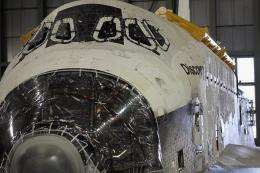Space Shuttle Discovery sits in the Vehicle Assembly Building as technicians continue to ready it for transport to Washington, DC's National Air and Space museum on July 19, in Cape Canaveral, Florida.
The end of the US space shuttle program brings the start of a new chapter for the remaining orbiters, which will soon take up residence as museum pieces in Florida, Virginia, California and New York.
Discovery, the oldest space shuttle of the fleet, will land at the Steven F. Udvar Hazy Center, a branch of the Smithsonian Institution's National Air and Space museum in Virginia, NASA announced in April.
Atlantis, the final shuttle to fly in space, will make its permanent home at Florida's Kennedy Space Center, host of repeated shuttle launches in the past three decades.
Endeavour will come home to roost at the California Science Center in Los Angeles.
The prototype Enterprise, which never actually flew in space, will be sent to New York for display on a US aircraft carrier docked off Manhattan, the USS Intrepid Sea, Air & Space Museum.
"Each shuttle has stories to be told, history to be shared," said NASA chief Charles Bolden when the designations were first announced earlier this year.
"They won't stop inspiring and they won't stop being a part of the fabric of America."
The question of where the shuttles would be displayed prompted a flurry of speculation, as curators and lawmakers lobbied for the surge in tourists eager for an up-close look at the journeyed spacecraft.
NASA's hefty $28 million price tag did little to dampen excitement and competition among nearly two dozen potential tourist spots and museums clamoring to house a piece of space history.
Those who missed out, including Texas, the home of Johnson Space Center and NASA's mission control, were vocal in their disappointment.
"Houston has played a critical role throughout the life of the space shuttle, but it is clear political favors trumped common sense and fairness in the selection of the final locations for the orbiter fleet," said Senator John Cornyn of Texas.
Texas Senator Kay Bailey Hutchison called the news "deeply disheartening," and said it was "unthinkable that the home of human space flight would not represent the ideal home for a retired orbiter.
NASA said a series of shuttle artifacts that would be spread nationwide, including shuttle simulators for the Adler Planetarium in Chicago and Texas A&M's Aerospace Engineering Department.
Johnson Space Center in Houston would also get flight deck pilot and commander seats, NASA said.
For those who have worked closely with the shuttles, the thought of sending them off to new homes has been hard, and so has the prospect of 8,000 workers in the area around Cape Canaveral losing their jobs as the shuttle program ends.
"We have taken care of Discovery -- for me it has been the past 11 years that I have been part of this team," Stephanie Stilson, shuttle transition and retirement flow director, told AFP last month.
"And now it is time for us to turn that responsibility over to someone else and that is going to be difficult," she said.
"I am really hoping to be involved with a future launch program of some sort. I really enjoy the work I do here at Kennedy Space Center, processing vehicles, I'm hoping there is a niche for me somewhere."
(c) 2011 AFP























